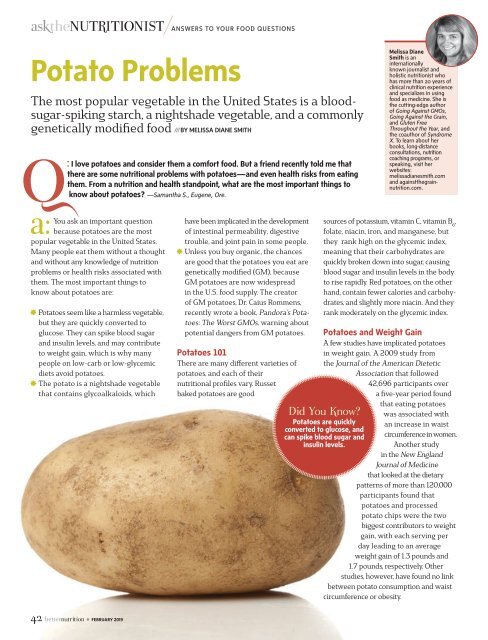Create successful ePaper yourself
Turn your PDF publications into a flip-book with our unique Google optimized e-Paper software.
asktheNUTRITIONIST/ANSWERS TO YOUR FOOD QUESTIONS<br />
Potato Problems<br />
The most popular vegetable in the United States is a bloodsugar-spiking<br />
starch, a nightshade vegetable, and a commonly<br />
genetically modified food /// BY MELISSA DIANE SMITH<br />
: I love potatoes and consider them a comfort food. But a friend recently told me that<br />
there are some nutritional problems with potatoes—and even health risks from eating<br />
them. From a nutrition and health standpoint, what are the most important things to<br />
know about potatoes? —Samantha S., Eugene, Ore.<br />
Melissa Diane<br />
Smith is an<br />
internationally<br />
known journalist and<br />
holistic nutritionist who<br />
has more than 20 years of<br />
clinical nutrition experience<br />
and specializes in using<br />
food as medicine. She is<br />
the cutting-edge author<br />
of Going Against GMOs,<br />
Going Against the Grain,<br />
and Gluten Free<br />
Throughout the Year, and<br />
the coauthor of Syndrome<br />
X. To learn about her<br />
books, long-distance<br />
consultations, nutrition<br />
coaching programs, or<br />
speaking, visit her<br />
websites:<br />
melissadianesmith.com<br />
and againstthegrainnutrition.com.<br />
a:You ask an important question<br />
because potatoes are the most<br />
popular vegetable in the United States.<br />
Many people eat them without a thought<br />
and without any knowledge of nutrition<br />
problems or health risks associated with<br />
them. The most important things to<br />
know about potatoes are:<br />
*<br />
*<br />
Potatoes seem like a harmless vegetable,<br />
but they are quickly converted to<br />
glucose. They can spike blood sugar<br />
and insulin levels, and may contribute<br />
to weight gain, which is why many<br />
people on low-carb or low-glycemic<br />
diets avoid potatoes.<br />
The potato is a nightshade vegetable<br />
that contains glycoalkaloids, which<br />
*<br />
have been implicated in the development<br />
of intestinal permeability, digestive<br />
trouble, and joint pain in some people.<br />
Unless you buy organic, the chances<br />
are good that the potatoes you eat are<br />
genetically modified (GM), because<br />
GM potatoes are now widespread<br />
in the U.S. food supply. The creator<br />
of GM potatoes, Dr. Caius Rommens,<br />
recently wrote a book, Pandora’s Potatoes:<br />
The Worst GMOs, warning about<br />
potential dangers from GM potatoes.<br />
Potatoes 101<br />
There are many different varieties of<br />
potatoes, and each of their<br />
nutritional profiles vary. Russet<br />
baked potatoes are good<br />
sources of potassium, vitamin C, vitamin B 6<br />
,<br />
folate, niacin, iron, and manganese, but<br />
they rank high on the glycemic index,<br />
meaning that their carbohydrates are<br />
quickly broken down into sugar, causing<br />
blood sugar and insulin levels in the body<br />
to rise rapidly. Red potatoes, on the other<br />
hand, contain fewer calories and carbohydrates,<br />
and slightly more niacin. And they<br />
rank moderately on the glycemic index.<br />
Potatoes and Weight Gain<br />
A few studies have implicated potatoes<br />
in weight gain. A 2009 study from<br />
the Journal of the American Dietetic<br />
Association that followed<br />
42,696 participants over<br />
a five-year period found<br />
that eating potatoes<br />
was associated with<br />
an increase in waist<br />
circumference in women.<br />
Another study<br />
in the New England<br />
Journal of Medicine<br />
that looked at the dietary<br />
patterns of more than 120,000<br />
participants found that<br />
potatoes and processed<br />
potato chips were the two<br />
biggest contributors to weight<br />
gain, with each serving per<br />
day leading to an average<br />
weight gain of 1.3 pounds and<br />
1.7 pounds, respectively. Other<br />
studies, however, have found no link<br />
between potato consumption and waist<br />
circumference or obesity.<br />
Did You Know?<br />
Potatoes are quickly<br />
converted to glucose, and<br />
can spike blood sugar and<br />
insulin levels.<br />
42 • FEBRUARY <strong>2019</strong>

















